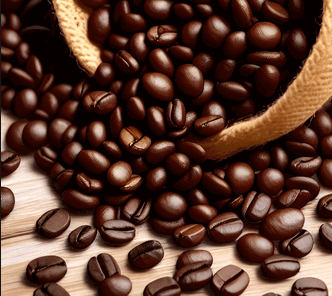What Type of Decaffeinated Coffee Beans Are of the Highest Quality?

<h2>High-Quality Decaffeinated Coffee Beans: A Comprehensive Guide</h2>
Decaffeinated coffee has gained immense popularity among coffee enthusiasts who seek the rich flavors and aromas of coffee without the stimulating effects of caffeine. To cater to this demand, coffee roasters and producers have dedicated significant efforts to developing high-quality decaffeinated coffee beans that rival their caffeinated counterparts.
<h3>What Makes Decaffeinated Coffee Beans High Quality?</h3>
The quality of decaffeinated coffee beans is determined by a combination of factors, including:
- <strong>Flavor:</strong> High-quality decaffeinated coffee beans retain the complex flavor profile of their caffeinated counterparts, exhibiting a balance of acidity, sweetness, and bitterness.
- <strong>Aroma:</strong> The decaffeination process should preserve the beans’ natural aromas, ensuring a rich and inviting scent when brewed.
- <strong>Freshness:</strong> Freshly roasted beans offer the most vibrant flavors and aromas. Look for beans with a recent roast date to guarantee freshness.
<h3>Decaffeination Methods</h3>
Various decaffeination methods are employed in the industry, each with its own impact on the final quality of the coffee beans:
- <strong>Swiss Water Process:</strong> This method uses water to extract caffeine without the use of chemical solvents, resulting in a decaffeinated coffee with a clean and balanced flavor.
- <strong>Direct Solvent Method:</strong> This method utilizes chemical solvents, such as methylene chloride or ethyl acetate, to dissolve and remove caffeine. It can potentially affect the flavor of the beans.
- <strong>Carbon Dioxide (CO2) Method:</strong> This method employs pressurized carbon dioxide to extract caffeine, preserving the beans’ flavor and aroma more effectively than direct solvent methods.
<h3>Factors Affecting Quality in Decaffeinated Coffee Beans</h3>
In addition to the decaffeination method, several other factors influence the quality of decaffeinated coffee beans:
- <strong>Bean Quality:</strong> The starting point for high-quality decaffeinated coffee is high-quality coffee beans. Factors such as bean maturity, processing techniques, and storage conditions can impact the final flavor.
- <strong>Processing Techniques:</strong> Proper roasting and grinding techniques are crucial for preserving the beans’ flavors and aromas.
- <strong>Storage Conditions:</strong> Decaffeinated coffee beans should be stored in airtight containers in a cool, dry place to maintain their freshness and prevent oxidation.
<h3>Evaluating Quality in Decaffeinated Coffee Beans</h3>
Experts assess the quality of decaffeinated coffee beans through cupping and sensory evaluation, considering the following characteristics:
- <strong>Flavor Profile:</strong> The coffee’s flavor should be complex and balanced, with a distinct origin character and no off-flavors.
- <strong>Acidity:</strong> Decaffeinated coffee should exhibit a pleasant acidity that contributes to its brightness and complexity.
- <strong>Body:</strong> The coffee’s body refers to its weight and texture on the palate, which should be full and satisfying.
- <strong>Aftertaste:</strong> A clean and pleasant aftertaste is indicative of high-quality decaffeinated coffee.
<h3>Popular Varieties and Regions for High-Quality Decaffeinated Coffee Beans</h3>
Certain coffee-growing regions and varieties are renowned for producing high-quality decaffeinated coffee beans:
- <strong>Colombia:</strong> Colombian decaffeinated coffee is known for its smooth and balanced flavor with notes of chocolate and nuts.
- <strong>Ethiopia:</strong> Ethiopian decaffeinated coffee often exhibits floral and fruity notes, with a bright and complex acidity.
- <strong>Brazil:</strong> Brazilian decaffeinated coffee is typically full-bodied and has a rich, nutty flavor.
- <strong>Guatemala:</strong> Guatemalan decaffeinated coffee is characterized by its sweet and spicy notes, with a medium body.
<h3>Tips for Choosing and Brewing High-Quality Decaffeinated Coffee</h3>
- <strong>Choose Reputable Brands:</strong> Look for coffee roasters and brands that prioritize quality in their decaffeinated coffee offerings.
- <strong>Brewing Methods:</strong> Experiment with different brewing methods to find the one that best suits your preferences. Pour-over, French press, and drip coffee makers can all produce excellent results.
- <strong>Grind Size:</strong> The grind size should be adjusted according to the brewing method. A medium grind is generally suitable for most home brewing methods.
<h3>Conclusion</h3>
Choosing high-quality decaffeinated coffee beans is essential for a satisfying coffee experience. By understanding the factors that contribute to quality, including the decaffeination method, bean origin, and processing techniques, coffee enthusiasts can make informed decisions and enjoy the rich flavors and aromas of decaffeinated coffee without compromising on taste.
<h3>Sources</h3>
- Best Decaf Coffee of 2024 – Cuisine at Home
- The Best Decaf Coffee of 2024, Tested & Reviewed – Serious Eats
- The 11 Best Decaf Coffees of 2024, Tested & Reviewed – The Spruce Eats
FAQs
;What factors determine the quality of decaffeinated coffee beans?
;
The quality of decaffeinated coffee beans is influenced by factors such as flavor, aroma, freshness, bean quality, processing techniques, and storage conditions.
;Which decaffeination method is best for preserving the flavor of coffee beans?
;
The Swiss Water Process is generally considered the best decaffeination method for preserving the flavor of coffee beans, as it uses water instead of chemical solvents.
;What are some popular varieties of high-quality decaffeinated coffee beans?
;
Popular varieties of high-quality decaffeinated coffee beans include Colombian, Ethiopian, Brazilian, and Guatemalan.
;How can I choose high-quality decaffeinated coffee beans?
;
To choose high-quality decaffeinated coffee beans, look for reputable brands that prioritize quality, check the roast date for freshness, and consider the flavor profile and origin of the beans.
;What is the best way to brew high-quality decaffeinated coffee?
;
The best way to brew high-quality decaffeinated coffee depends on personal preference, but popular methods include pour-over, French press, and drip coffee makers. Experiment with different grind sizes and brewing techniques to find the combination that suits your taste.
